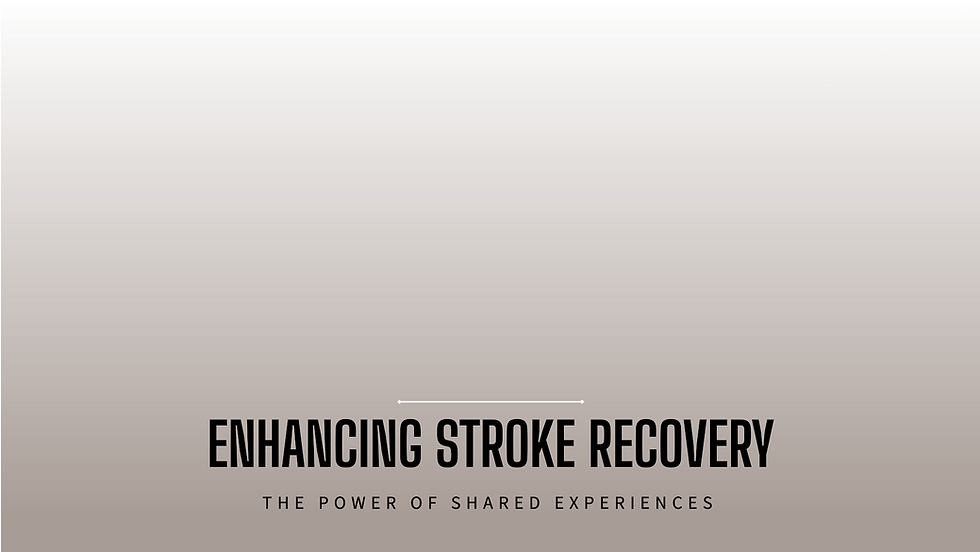The Power of Shared Experiences: Enhancing Stroke Recovery Through Peer Mentoring
- Admin
- Nov 23, 2024
- 2 min read

Introduction: (www.youtube.com/kneetiegorungo)
Stroke recovery is a journey marked by challenges, triumphs, and the relentless pursuit of regaining lost abilities. While medical interventions play a crucial role in this process, the emotional and psychological aspects of recovery often require support that extends beyond clinical treatments. Peer mentoring, a model that connects stroke survivors with others who have navigated similar paths, has emerged as a transformative approach to rehabilitation. This article explores the impact of peer mentoring on stroke recovery, highlighting how shared experiences can inspire hope, foster resilience, and enhance the overall rehabilitation journey for survivors.
The Role of Peer Mentoring in Stroke Recovery
Peer mentoring involves one-on-one or group support from individuals who have experienced a stroke and have made significant progress in their recovery. These mentors provide guidance, encouragement, and practical advice to those newly adjusting to life post-stroke. The benefits of this supportive relationship are multifaceted:
1. Emotional Support: Peer mentors offer empathy and understanding, creating a safe space for survivors to express their fears, frustrations, and aspirations. This emotional support can alleviate feelings of isolation and depression, which are common among stroke survivors.
2. Shared Knowledge and Strategies: Mentors can share valuable insights and coping strategies learned through their recovery processes. This knowledge exchange can empower mentees to navigate rehabilitation complexities with greater confidence.
3. Motivation and Hope: Witnessing the progress of peers can serve as a powerful motivator for stroke survivors. Peer mentors exemplify what is possible through persistence and resilience, instilling hope and encouraging a positive outlook on recovery.
4. Enhanced Self-Efficacy: Engaging with mentors who have successfully overcome similar obstacles can boost survivors' belief in their ability to achieve their own recovery goals. This enhanced self-efficacy can drive engagement in rehabilitation activities and foster a proactive approach to recovery.
Implementing Peer Mentoring Programs
Successful peer mentoring programs require thoughtful planning and coordination to ensure that the needs of both mentors and mentees are met. Key considerations include:
Training for Peer Mentors: Providing mentors with training on effective communication, empathy, and confidentiality is essential for building productive mentoring relationships.
Matching Process: Carefully matching mentors and mentees based on factors such as age, interests, and stroke-related challenges can enhance the relevance and impact of the mentoring experience.
Ongoing Support and Supervision: Offering regular support and supervision for mentors ensures that they are equipped to handle the emotional demands of mentoring and can address any challenges that arise.
Conclusion:
Peer mentoring harnesses the power of shared experiences to enhance stroke recovery, offering survivors not just practical advice but also emotional solidarity and hope. By integrating peer mentoring into comprehensive stroke rehabilitation programs, healthcare providers can address the holistic needs of survivors, fostering a community of support that empowers individuals to navigate their recovery journey with confidence and optimism. As more survivors engage in peer mentoring, the collective wisdom and resilience of the stroke community continue to grow, paving the way for more effective and compassionate rehabilitation approaches.
The domain www.dubaitelemedicine.com is for sale. Please contact us at www.kneetie.com
#KneeTie #Stroke #youtube/kneetiegorungo #DubaiTelemedicine




















Comments